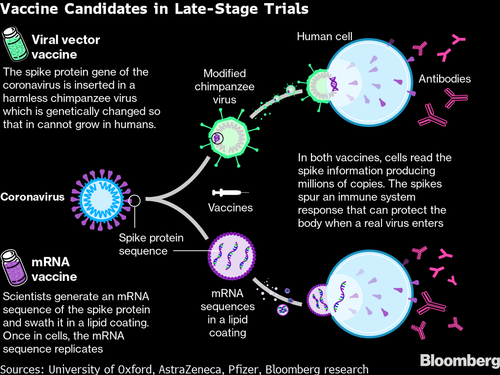France Raises More Questions About AstraZeneca Jab Safety As Oxford Releases New Data
The latest update on the AstraZeneca-Oxford COVID jab was released Tuesday afternoon in a report from the University which offered more insight on exactly when vaccine-induced immunity begins, and how effective the vaccine can be after its first dose and after its second.
Unsurprisingly, the data offer a more optimistic read than the batch released by AZ and Oxford the first time around.
But they also suggest that the vaccine is actually more effective overall if doctors wait roughly 3 months before inoculating patients with the second dose, which provides support for “current policy” in the UK.
However, in the US, the FDA-recommended vaccination dosing schedule is 21 days, which has endured despite logistical problems and other issues that have caused delivery delays in NYC and elsewhere (so much for the consistency of the “science”), And the new AstraZeneca vaccine might be able to fix all that.
According to the research team, the first dose alone offers 76% protection from symptomatic COVID 22 days post-vaccination. But the jab successfully offers sustained protection through a 3-month period, even without receiving the second dose, a data point that has already been transformed into a marketing opportunity by AstraZeneca.
Prof Andrew Pollard, Chief Investigator of Oxford Vaccine Trial and co-author of the paper, said in a statement: “These new data provide an important verification of the interim data that was used by more than 25 regulators including the MHRA and EMA to grant the vaccine emergency use authorization.”
“It also supports the policy recommendation made by the Joint Committee on Vaccination & Immunisation for a 12-week prime-boost interval, as they look for the optimal approach to roll out, & reassures us that people are protected from 22 days after a single dose of the vaccine.”
The new data, which are culled from cases extended through Dec. 7, purportedly show the optimal window for the second booster dose could be up to 14 weeks. That means it’s less risky to give patients the AstraZeneca shot, because even if there are supply delays, patients won’t be badly harmed.
After the second dose, immunity rises to 82.4%, according to data taken from cases throughout the 3-month interval window. The research team offered the data with a 95% confidence interval of 62.7% – 91.7% at 12+ weeks

In another “unprecedented” update, the data suggest the vaccine helps prevent transmission of the virus, with 67% reduction in positive swabs among those vaccinated”
“However, overall cases of any PCR+ were reduced by 67% (95%CI 49%, 78%) after a single SD vaccine suggesting the potential for a substantial reduction in transmission,” the authors of the paper wrote.
Officials likely hoped the report would help cement public support for the AstraZeneca vaccine, (at least in Europe, its primary market, where it has inked deals for billions of doses). The AZ vaccine is, notably, also less effective than Russia’s “Sputnik V” vaccine, according to data published by the Lancet a few days back.
Unfortunately, its release was timed with more “problematic” comments from French President Emmanuel Macron and the French authorities.
Specifically, French health authorities have approved the vaccine, but they have also warned that the AZ-Oxford vaccine should only be given to people aged under 65, after the initial preliminary reports on AZ released late last year suggested some adverse health reactions in older patients.
France has approved the jab, but it ranks as one of the most vaccine-skeptic among the major European economies.
Readers can find the entire research paper below:
SSRN-id3777268 by Joseph Adinolfi Jr. on Scribd
Tyler Durden
Wed, 02/03/2021 – 04:15
via ZeroHedge News https://ift.tt/2YCBAl1 Tyler Durden

